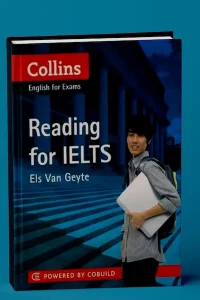Specially created for learners of English who plan to take the Academic IELTS exam, Collins Reading for IELTS PDF will improve the required ability to communicate effectively in English at university.
About Collins Reading for IELTS
Collins English for Exams series has been designed to be easy to use, whether by learners studying at home on their own or in a classroom with a teacher: • Instructions are easy to follow
- Exercises are carefully arranged from simpler to more difficult.
- All units follow the same basic structure to breed familiarity and confidence.
- The answer key is clear and comprehensive.
Because these fundamentals are in place, classroom teachers can focus on providing a stimulating learning environment, maintaining motivation through pair and group work, and helping learners develop good learning strategies through exploration and reflection.
This resource will explain how the material works and how it can be adapted to make the most of the classroom learning context.
Each chapter in Reading for IELTS has a similar three-part structure, which can form the basis of regular classroom routines. It will provide approximately 4 hours of content, 2 of which we recommend doing in class and 2 of which will make ideal homework tasks.
Part 1: Vocabulary
We recommend that vocabulary exercises be done at home before the lesson.
- This preparation will get learners thinking about the topic and will introduce them to relevant vocabulary (activate schemata) without eating into classroom time.
- As repeated exposure to new vocabulary is required for mastery, the first 10–20 minutes of the lesson can be spent doing a ‘spot check’ of a selection of the vocabulary covered in Part 1. The lesson plans provided show how this can be done through game-like activities, which also work as ice-breakers.
- Encourage the students to complete the exercises without a dictionary to develop the skill of inferring the meaning of unfamiliar words from context.
Part 2: Practice exercises
Chapters 1–11 provide practice on the task types commonly encountered in the IELTS test.
- Each chapter provides an explanation of each task type followed by a variety of exercises of increasing difficulty. The exercises break down each exam task into component skills so that learners can acquire the necessary underlying competencies.
- The lesson plans provided for each unit concentrate on this section and offer roughly two hours of material, including suggestions for optional extension activities.
- Most exercises can be done individually and checked in pairs or small groups. Pair and group work trains learners to reflect on and explain how they have approached the task. This form of practice, along with the exam tips provided in each chapter, will help them develop a better understanding of exam strategies (metacognitive skills).
Part 3: Exam practice
This can be given as homework.
- Exam practice allows leaners to integrate the skills they have learned and practise them under timed conditions.
- The answer key provides information about why certain answers are correct or incorrect.
- These exercises will help learners assess their readiness for the actual exam.
Download Collins Reading for IELTS pdf
If your reading is preventing you from getting the score you need in IELTS, Collins Reading for IELTS can help. Don’t let one skill hold you back.
Collins Reading for IELTS has been specially created for learners of English who plan to take the Academic IELTS exam to demonstrate that they have the required ability to communicate effectively in English at university. What is IELTS?
The International English Language Testing System (IELTS) is sat by over 1.4 million candidates around the world every year.
It is the most common test used by universities for foreign students to prove their language level. IELTS is also increasingly used for immigration purposes, with Australia, New Zealand, and Canada all requiring visa applicants whose first language is not English to submit an IELTS grade.
The system tests candidates’ Reading, Writing, Listening and Speaking in four separate papers. Usually, students must achieve a good mark in all four skills in order to gain entry to the course, job, or country of their choice. For this reason, candidates will often sit the exam numerous times to secure the score that they need.
There are two IELTS Reading papers: General and Academic. Collins Reading for IELTS concentrates on the Academic paper.
Powered by COBUILD The 4-billion-word Collins corpus is the world’s largest database of the English language. It is updated every month and has been at the heart of Collins COBUILD for over 20 years.


